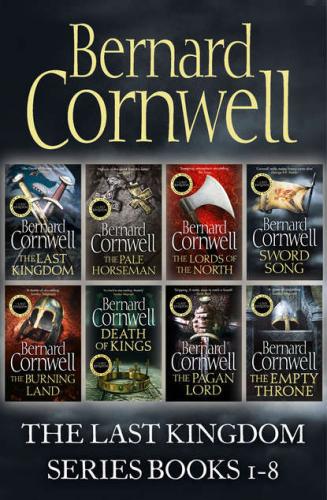My name is Uhtred. I am the son of Uhtred, who was the son of Uhtred and his father was also called Uhtred. My father’s clerk, a priest called Beocca, spelt it Utred. I do not know if that was how my father would have written it, for he could neither read nor write, but I can do both and sometimes I take the old parchments from their wooden chest and I see the name spelled Uhtred or Utred or Ughtred or Ootred. I look at those parchments which are deeds saying that Uhtred, son of Uhtred is the lawful and sole owner of the lands that are carefully marked by stones and by dykes, by oaks and by ash, by marsh and by sea, and I dream of those lands, wave-beaten and wild beneath the wind-driven sky. I dream, and know that one day I will take back the land from those who stole it from me.
I am an Ealdorman, though I call myself Earl Uhtred, which is the same thing, and the fading parchments are proof of what I own. The law says I own that land, and the law, we are told, is what makes us men under God instead of beasts in the ditch. But the law does not help me take back my land. The law wants compromise. The law thinks money will compensate for loss. The law, above all, fears the bloodfeud. But I am Uhtred, son of Uhtred, and this is the tale of a bloodfeud. It is a tale of how I will take from my enemy what the law says is mine. And it is the tale of a woman and of her father, a king.
He was my king and all that I have I owe to him. The food that I eat, the hall where I live and the swords of my men, all came from Alfred, my king, who hated me.
This story begins long before I met Alfred. It begins when I was nine years old and first saw the Danes. It was the year 866 and I was not called Uhtred then, but Osbert, for I was my father’s second son and it was the eldest who took the name Uhtred. My brother was seventeen then, tall and well-built, with our family’s fair hair and my father’s morose face.
The day I first saw the Danes we were riding along the sea shore with hawks on our wrists. There was my father, my father’s brother, my brother, myself and a dozen retainers. It was autumn. The sea-cliffs were thick with the last growth of summer, there were seals on the rocks, and a host of seabirds wheeling and shrieking, too many to let the hawks off their leashes. We rode till we came to the criss-crossing shallows that rippled between our land and Lindisfarena, the Holy Island, and I remember staring across the water at the broken walls of the abbey. The Danes had plundered it, but that had been many years before I was born, and though the monks were living there again the monastery had never regained its former glory.
I also remember that day as beautiful and perhaps it was. Perhaps it rained, but I do not think so. The sun shone, the seas were low, the breakers gentle and the world happy. The hawk’s claws gripped my wrist through the leather sleeve, her hooded head twitching because she could hear the cries of the white birds. We had left the fortress in the forenoon, riding north, and though we carried hawks we did not ride to hunt, but rather so my father could make up his mind.
We ruled this land. My father, Ealdorman Uhtred, was lord of everything south of the Tuede and north of the Tine, but we did have a king in Northumbria and his name, like mine, was Osbert. He lived to the south of us, rarely came north, and did not bother us, but now a man called Ælla wanted the throne and Ælla, who was an Ealdorman from the hills west of Eoferwic, had raised an army to challenge Osbert and had sent gifts to my father to encourage his support. My father, I realise now, held the fate of the rebellion in his grip. I wanted him to support Osbert, for no other reason than the rightful king shared my name and foolishly, at nine years old, I believed any man called Osbert must be noble, good and brave. In truth Osbert was a dribbling fool, but he was the king, and my father was reluctant to abandon him. But Osbert had sent no gifts and had shown no respect, while Ælla had, and so my father worried. At a moment’s notice we could lead a hundred and fifty men to war, all well armed, and given a month we could swell that force to over four hundred foemen, so whichever man we supported would be the king and grateful to us.
Or so we thought.
And then I saw them.
Three
